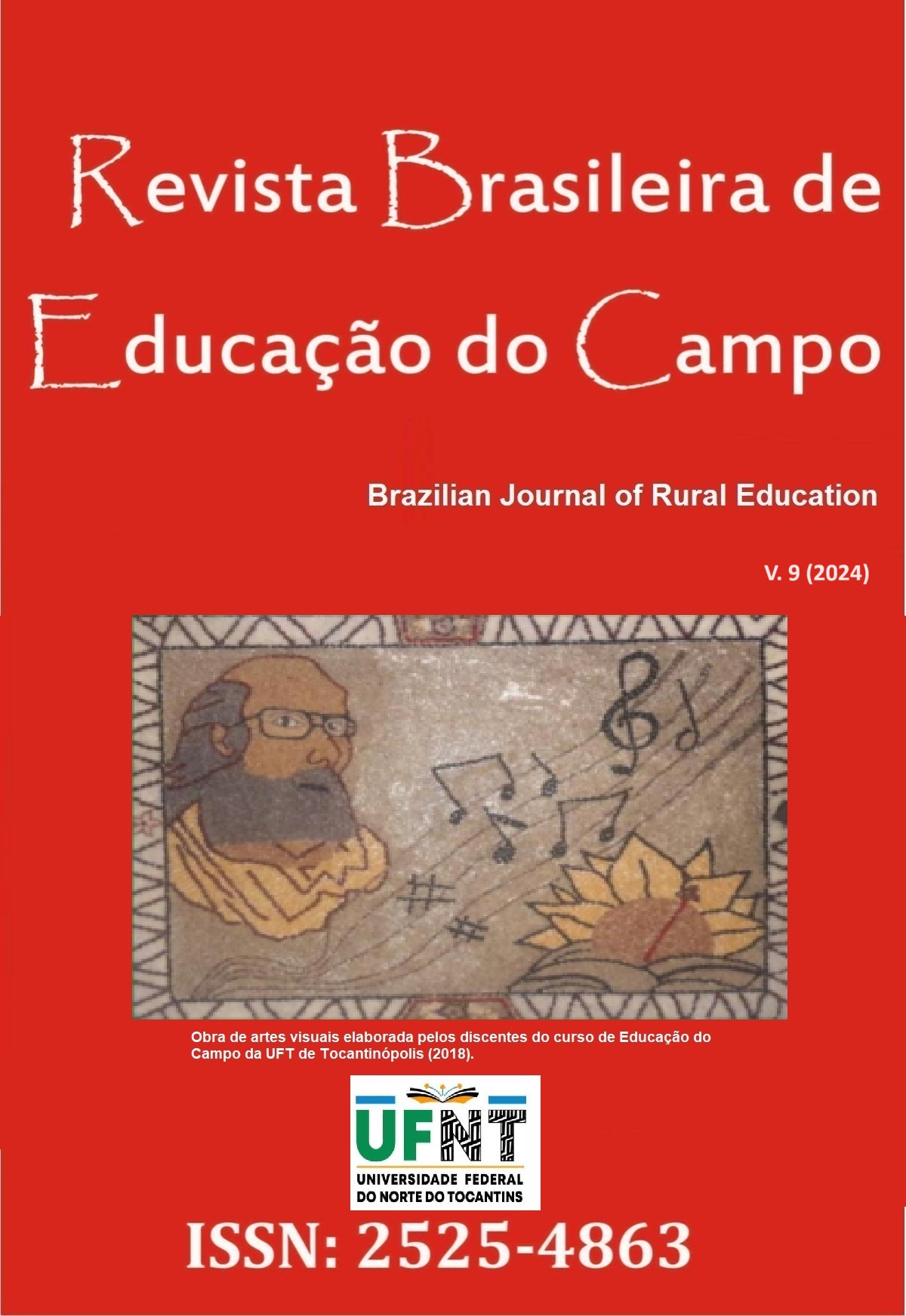Peasant Education, Water and Forest Education and Popular Health Education in times of the Covid-19 pandemic
DOI :
https://doi.org/10.70860/ufnt.rbec.e18855Résumé
ABSTRACT. Given the context of the pandemic that has ravaged the world, the text's object is the relationship between Peasant Education and Popular Health Education in the face of resistance practices in confronting Covid-19, considering the denialist and negligent stance of Brazilian State government officials, especially in the most serious moments of the disease. In this sense, the central objective of the study was to reflect on the consequences of the pandemic on Peasant Education, as well as Water and Forest Education, and on coping actions based on Popular Health Education. Methodologically, the article is based on bibliographic and documentary studies, in addition to a brief statement from an indigenous leader. The analyses indicate that the State has failed to implement public policies and that there are still limits in the implementation of the National Policy for Comprehensive Health of Populations in the Countryside, Forests and Waters; there is also a need to expand scientific production on Peasant Education and Popular Education in Health. In conclusion, we observe the importance of the resistance of Countryside, Waters and Forests people and the recognition of popular knowledge in dialogue with scientific knowledge.
Téléchargements
Références
Arruda, C. A. M., Pessoa, V. M., Soares, R. A. S., Carneiro, F. F., & Matos, A. S. (2017). Lutas, direitos e Estado brasileiro: diálogo entre as políticas públicas para o trânsito do campo, da floresta e das águas. In Carneiro, F. F., Pessoa, V. M., & Teixeira, A. C. A. (Orgs.). Campo, Floresta e Águas: práticas e saberes em saúde (pp. 83-105). Brasília, DF: Editora UnB. DOI: https://doi.org/10.7476/9786558460510.0006
Bufrem, L. S. (2016). Informação, conhecimento e verdade: discussões contemporâneas. Brazilian Journal of Information Studies: Research Trends, 10(2), 89-102. DOI: https://doi.org/10.36311/1981-1640.2016.v10n2.11.p89
Conselho Nacional da Saúde. (2013b). Para entender o controle social na saúde. Ministério da Saúde. Governo Federal do Brasil. Recuperado de https://conselho.saude.gov.br/biblioteca/livros/Manual_Para_Entender_Controle_Social.pdf
Coutinho, C. N. (2008). Marxismo e Política: a dualidade de poderes e outros ensaios. São Paulo, SP: Cortez.
Dantas, N. L. (2009). Dialogismo e arte na gestão em saúde: a perspectiva popular nas Ciranda da vida em Fortaleza (Tese de Doutorado). Universidade Federal do Ceará, Ceará.
Dantas, V. L. A., & Pulga, V. L. (2020). Educação Popular e Saúde: Tecendo redes de cuidados, inovações e aprendizagens coletivas. In Pulga, V. L et al. (Orgs.). Educação Popular, Equidade e saúde - Dispositivo pedagógico e práticas lúdicas de aprendizagem na saúde: a caixa de ferramentas nas relações de ensino aprendizagem (pp. 196-220). Porto Alegre, RS: Rede Unida.
Freire, P. (1982). Educação como prática da liberdade. Rio de Janeiro, RJ: Paz e Terra.
Freire, P. (1987). Pedagogia do Oprimido. Rio de Janeiro, RJ: Paz e Terra.
Freire, P. (1996). Pedagogia da Autonomia: saberes necessários à prática educativa. São Paulo, SP: Paz e Terra.
IBGE – Instituto Brasileiro de Geografia e Estatística. (2020). Atlas do Espaço Rural Brasileiro. Rio de Janeiro: Recuperado de: https://www.ibge.gov.br/geociencias/atlas/tematicos/16362-atlas-do-espaco-rural-brasileiro.html
Ministério da Saúde. (2013). Políticas de Promoção da Equidade em Saúde. Governo Federal do Brasil. Recuperado de https://bvsms.saude.gov.br/bvs/publicacoes/politica_prococao_equidade_saude.pdf
Paludo, C. (2001). Educação popular em busca de alternativas: uma leitura desde o campo popular. Porto Alegre: Tomo Editorial.
Raffestin, C. (1980). Por uma geografia do poder. São Paulo: Ática.
Soares, N. (2023, 27 de maio). MST vai doar 25 toneladas de alimentos no encerramento da Feira Nacional da Reforma Agrária. Brasil de Fato. Recuperado de https://www.brasildefato.com.br
Souza, J. F. (2007). E a Educação Popular: Quê? Uma pedagogia para fundamentar a educação, inclusive escolar, necessária ao povo brasileiro. Recife, PE: Bagaço.
Téléchargements
Publié-e
Comment citer
Numéro
Rubrique
Licence
© Maria Isabel Farias , Adalberto Penha de Paula, Solange Todero Von Onçay 2024

Cette œuvre est sous licence Creative Commons Attribution 4.0 International.
Proposal for Copyright Notice Creative Commons
1. Policy Proposal to Open Access Journals
Authors who publish with this journal agree to the following terms:
A. Authors retain copyright and grant the journal right of first publication with the work simultaneously licensed under the Creative Commons Attribution License that allows sharing the work with recognition of its initial publication in this journal.
B. Authors are able to take on additional contracts separately, non-exclusive distribution of the version of the paper published in this journal (ex .: publish in institutional repository or as a book), with an acknowledgment of its initial publication in this journal.
C. Authors are permitted and encouraged to post their work online (eg .: in institutional repositories or on their website) at any point before or during the editorial process, as it can lead to productive exchanges, as well as increase the impact and the citation of published work (See the Effect of Open Access).














